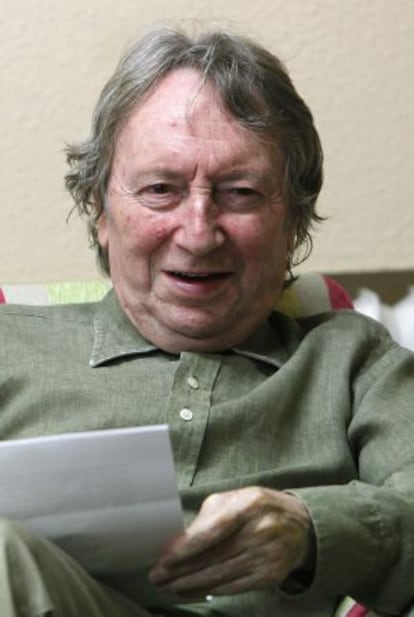Elías Querejeta, legendary Spanish film producer, dies at 78
Former Real Sociedad soccer player gave wings to careers of Carlos Saura and Víctor Erice


If anybody in the Spanish movie industry ever worked hard to earn the title of “The Producer,” that is Elías Querejeta, who died on Sunday morning in his Madrid home at the age of 78.
A driving force behind Spanish cinema (he produced 55 movies and wrote 23) and a prestigious figure in European film, the Basque-born Querejeta leaves behind a legacy of essential viewing for scholars of European art film. His work also serves to help younger generations understand the role of a producer; Querejeta gave wings to the careers of directors such as Carlos Saura, Jaime Chávarri, Emilio Martínez Lázaro, Fernando León de Aranoa, Víctor Erice and his own daughter, Gracia Querejeta.
“I always have fun with my work, whether as a producer or a director,” he once said in an interview with EL PAÍS. “I am even present during the film editing, and I couldn’t conceive of this (job) without passion and commitment.”
Early in his career, his role model was the legendary MGM producer Irving G. Thalberg. “I was always interested in his passionate approach to production.”
Yet Querejeta did not seem like a natural-born filmmaker at first. His earliest memories were of a happy childhood and a passion for soccer. By the age of 18 he was making his debut in the Spanish first division with San Sebastián’s team, Real Sociedad. But his career in sports ended in 1958, when he moved to Madrid to set up his own film production company.
In 1960 and 1962, he directed the short documentaries A través de San Sebastián (Through San Sebastián) and A través del fútbol (Through soccer) in partnership with his close friend Antonio Eceiza. He did not direct again until 2009 when he made another documentary, Cerca de tus ojos (Near your eyes), about a journalist doing human rights research.
I always have fun with my work, whether as a producer or a director”
“It’s true that all my work in this genre follows a line of thought that concerns itself with specific subject matter, and a certain way of viewing that I call the documentary movie,” he said about this aspect of his work.
But those documentary beginnings quickly evolved towards fiction in partnership with the director Carlos Saura, who would go on to solo fame with movies such as Tango and Flamenco. Together, both men gave the world an impressive list of award-winning titles, including La caza, which won the Best Director award at the 1965 Berlin International Film Festival; Peppermint frappé, winner of the Berlin Silver Bear in 1967; La prima Angélica, which took the 1974 Jury Prize at Cannes; and Deprisa, deprisa, winner of the 1981 Berlin Golden Bear.
In a documentary about Querejeta released in December of last year, Saura stated that eventually the partnership eroded in much the same way as a romantic relationship withers away. “But he never tried to meddle with the script,” the famed director noted. “We are like an elderly couple with a lot of successful children.”
Another director who worked with Querejeta, Manuel Gutiérrez Aragón, admitted that the producer “sticks his nose everywhere.”
More recently, Querejeta partnered with Fernando León de Aranoa to create Mondays in the Sun (2002), an award-winning drama about unemployment featuring actor Javier Bardem.
His daughter Gracia, an actress and director, said that even after she told him she wanted to pursue a career in film, her father forced her to get a university degree first.
Querejeta received all the honors that Spain can bestow on its filmmakers: the National Film Award in 1986 and the Film Academy’s Gold Medal in 1998, when he was told by academy president José Luis Borau that “Spanish cinema has followed in your wake for a long time, feeding off your prestige, your cheek and your courage.”
Tu suscripción se está usando en otro dispositivo
¿Quieres añadir otro usuario a tu suscripción?
Si continúas leyendo en este dispositivo, no se podrá leer en el otro.
FlechaTu suscripción se está usando en otro dispositivo y solo puedes acceder a EL PAÍS desde un dispositivo a la vez.
Si quieres compartir tu cuenta, cambia tu suscripción a la modalidad Premium, así podrás añadir otro usuario. Cada uno accederá con su propia cuenta de email, lo que os permitirá personalizar vuestra experiencia en EL PAÍS.
¿Tienes una suscripción de empresa? Accede aquí para contratar más cuentas.
En el caso de no saber quién está usando tu cuenta, te recomendamos cambiar tu contraseña aquí.
Si decides continuar compartiendo tu cuenta, este mensaje se mostrará en tu dispositivo y en el de la otra persona que está usando tu cuenta de forma indefinida, afectando a tu experiencia de lectura. Puedes consultar aquí los términos y condiciones de la suscripción digital.








































